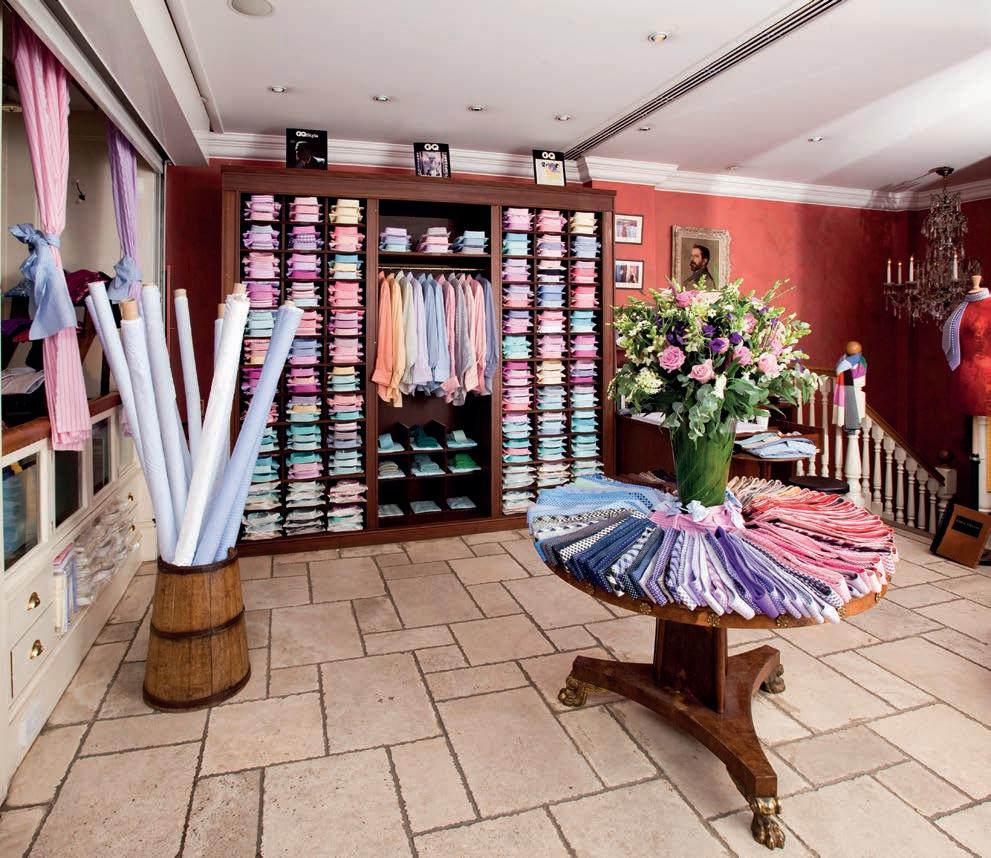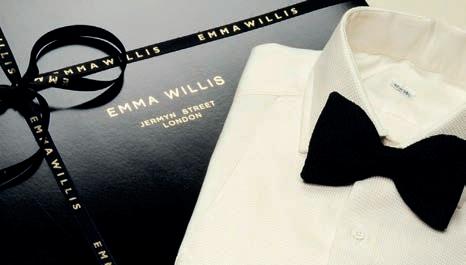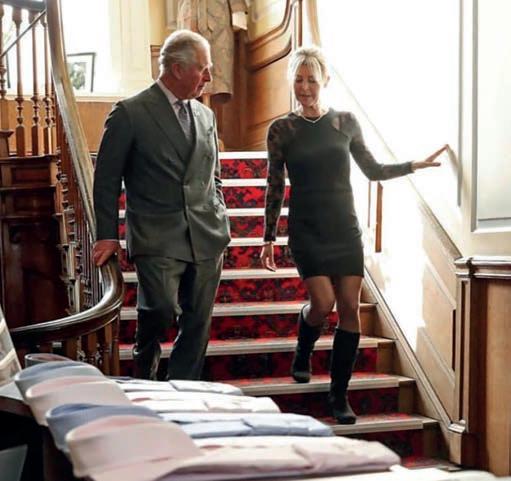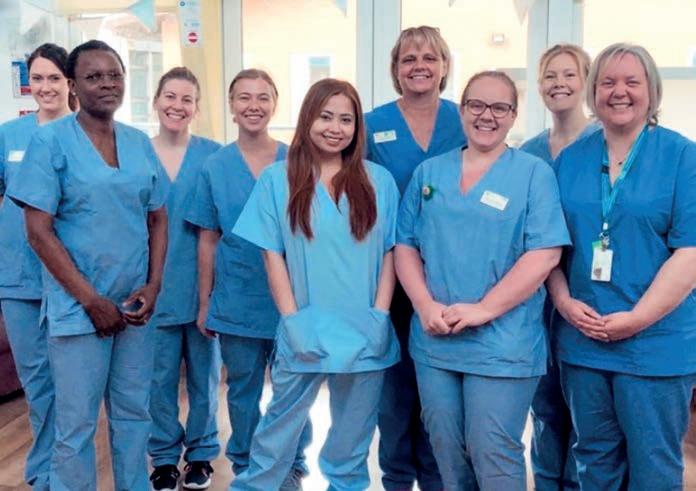
7 minute read
Emma Willis
OT Profile
Emma Willis (1981) MBE
Emma Willis’s name is synonymous with the luxury Jermyn Street brand which is a favourite amongst Hollywood A-listers and royalty alike. But this glamourous lady is much more than the name behind a luxury fashion label. Passionate about British manufacturing, she was awarded an MBE for her services to entrepreneurship and received the Prime Minister’s Points of Light award in recognition of her voluntary work. Now, in response to the COVID-19 pandemic, she has turned the cutting tables and sewing machines in her historic Gloucester workshop to the production of protective scrubs and gowns for NHS hospital staff.
Time and again, this celebrated businesswoman has used her success to give something back in a way that perfectly embodies Tudor’s motto, Habeo ut Dem (I have that I may give). But for Emma, success didn’t happen overnight; she worked hard to achieve it. She shares her journey to finding a career that ‘ticks all the boxes’ and her advice for other aspiring entrepreneurs.
“I have been interested in fashion since I was very young: I drew a lot of purple bell-bottoms and platform shoes during my time at Tudor,” Emma laughs. But her first love had always been the arts, so after her A Levels she

read English at UCL, before transferring to The Slade to study fine art. She enjoyed a busy social life in London and spent much of her free time singing in a band. “Places at The Slade were highly prized,” Emma explains, “and I started to realise that spending a lot of time alone drawing wasn’t for me and I didn't deserve my place there.” So, she left her course and took a temporary job selling clothes door-to-door in order to pay the rent whilst doing portraits by commission and joining a band as a singer-songwriter. The men’s shirts were the clothes she liked the best and she moved from selling these door-to-door to selling by appointment at businesses in
London – something she found came naturally. At this stage, selling shirts was nothing more than an effective way to make money so that she could fund the creative things she loved: writing, drawing and singing.
After a few years spent working for a shirt company which had head-hunted her to establish a direct-selling arm of their business, Emma decided to set up on her own. She discovered a small, bespoke shirt factory in London, which she took on fifty-fifty with a business partner. Having worked on the sales side, this was her first real introduction to the world of manufacturing, and she enjoyed getting to know the people on the production side, gaining an appreciation of the skills and craftsmanship of those making clothes behind the scenes. “Cutters, pattern makers and sewers are so important – it’s not just about the glamour of designers,” Emma says with conviction. The industry was in decline, as the majority of big British brands were moving their production overseas at the time. All of the employees in Emma’s factory were in their fifties and their skills were becoming a dying art. Emma was passionate about keeping shirt-making skills alive in the UK and in 1989, aged just twenty-six, created the brand Emma Willis Handmade Shirts.

In order to keep the factory in business, Emma needed to generate sales for her bespoke handmade shirts, no mean feat in the height of a recession. “Getting your contacts right and building your customer base are key,” she stresses. “Then, if you have a good product – something of quality, that you are proud of and that you love yourself – and good sales ability, you have every chance of success.” Her intuitive understanding of her customers helped her business to succeed in the challenging economic environment. She would visit them to measure and take orders, a service which made their lives easier. Referrals played an important part in expanding her customer base; when she sold shirts to someone, she would offer them a 10% discount if they gave her the details of ten friends who might be interested. “Dare to ask”, Emma advises, “but ask in the right way: a successful person is a busy person, you don’t want to be a burden to them.”

The recession in the UK inspired Emma to apply this approach to selling shirts in New York as well, making contacts through existing clients, then travelling across the pond to measure and take orders.
In 1999, Emma opened her sumptuous Jermyn Street shop. Until that point, she had been playing the long game: she enjoyed the challenge, freedom and constant learning process of running her own business, but it was not the career of her dreams. Drawing, singing and writing hadn’t paid the bills; selling shirts had. Opening her shop now offered the perfect outlet for her creativity as well as her business acumen. She designed the shop with fellow OT Penelope Chilvers (1980) to reflect the beauty and craftmanship of her handmade shirts: with a handcrafted shop front, bespoke cabinetry, antique furniture, fine art and fresh flowers. Her flair for visual art can be seen throughout the shop, “fabrics, textures, weaves and designs all need to work well together and be pleasing to the eye,” she explains. And, more recently, she has taken the same pleasure in developing online and social media spaces for her business, which are equally inviting and visually appealing. Emma is now in a career she absolutely loves and which ‘ticks all the boxes’, but she is keen to share with other aspiring entrepreneurs her belief that she could not have got there without the early years and the hard slog. “Understanding all areas of a business helps you value everyone and their role,” she says. “You earn respect too, if the path has been challenging and you have clearly worked hard to create a business and jobs for others.”

Emma is now in a career she absolutely loves and which ‘ticks all the boxes’, but she is keen to share with other aspiring entrepreneurs her belief that she could not have got there without the early years and the hard slog. “Understanding all areas of a business helps you value everyone and their role,”

Far from resting on her Laurels, Emma has used her hard-earned success to give something back. As well as setting up training schemes to provide career opportunities for young people - allowing them to ‘earn as they learn’ and, hopefully, keeping traditional English shirt making techniques alive - Emma founded the charity Style for Soldiers. This came about as a result of an interview she heard on Radio 4 in 2007, at the height of the casualties coming back from Iraq and Afghanistan, in which two servicemen who had suffered serious injuries talked about losing their jobs as a result and with that their friends, career and their identity. Emma was deeply moved and wanted to do something to help. Realising that one thing it was in her power to do was make a shirt to fit anyone, she began visiting patients at the Military Rehabilitation Hospital every two months, measuring them for a bespoke shirt as a gift of thanks for their bravery and sacrifice. Emma also designed a black ebony walking stick for those that needed one, with a silver collar engraved with regiment and initials. She understood that smart, well-fitting clothing, which ex-servicemen and women could wear for interviews and formal occasions, could help with confidence and building a new sense of identity. She approached various English brands to assist; M&S and Reiss have now given over 750 suits, Russell & Bromley over 250 shoes, Burberry 200 trench coats and Lock & Co Hatters 100s of hats. At the moment Emma’s company is making and donating 100s of scrubs for the NHS, to which Benedict Cumberbatch gave £11,000 with the message, “Love my shirts but even more the scrubs you are making.”
It is gratifying that this driven and compassionate lady has received the recognition she deserves both for her contribution to British business and for her charitable initiatives: an inspiration for Tudor girls, past and present. R


Right; Nurses of Luton Hospital wearing the scrubs made by Emma's company.
Below: A few of the ex-servicemen who've been helped by Emma's initiative.
Bottom left: HRH The Prince of Wales visiting Emma's Gloucester workshop.












